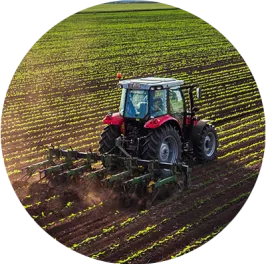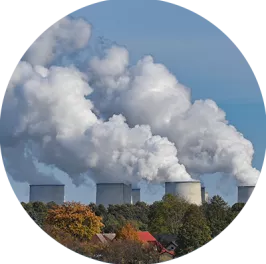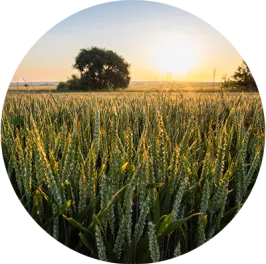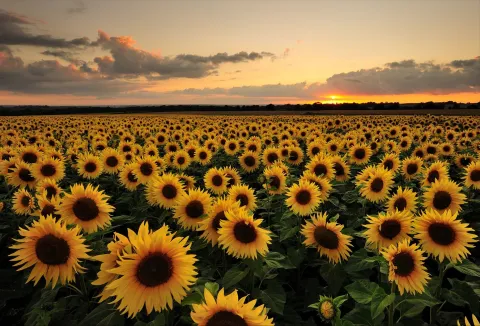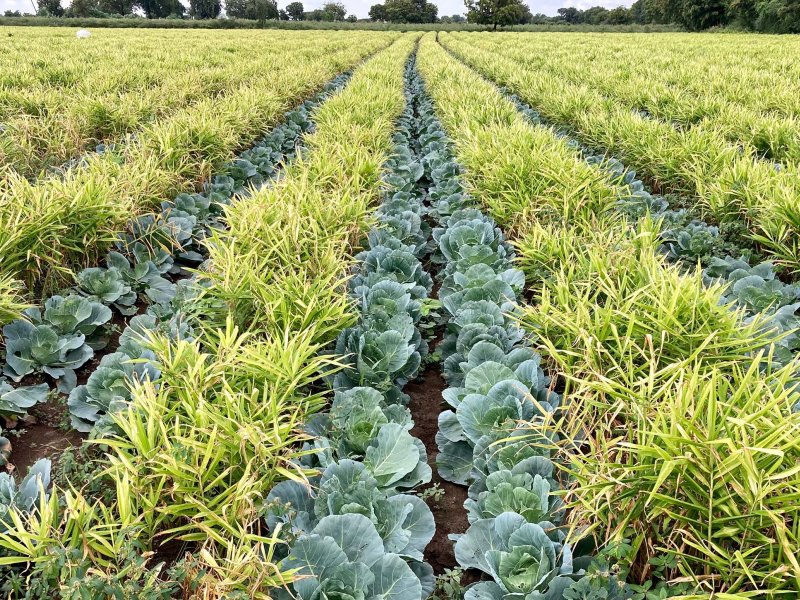
Farming isn’t easy. A changing climate, regulatory expectations, economic pressures, labor issues, environmental concerns and evolving technologies all combine to make modern-day agriculture extremely challenging.
Then there is soil erosion, biodiversity loss, resource management, fluctuating consumer tastes, and severe weather events. In addition, the natural world has its own difficulties, including pests and disease which threaten harvests.
While modern agriculture offers a wide variety of solutions, the outcome is not always guaranteed, in part because every farm is different with its own unique landscape, soil, and potential yields.
Farmers must deal with many problems, including how to:
-
Cope with climate change, soil erosion and biodiversity loss
A changing climate poses a significant challenge to agriculture, affecting crop viability, yields, farming operations, working conditions, and food security. Soil erosion, often caused by wind and water but also a result of deforestation, over-tilling and over-development, is a major concern globally as it reduces soil fertility, affects productivity and can contaminate water sources. In addition, the decline in biodiversity due to land use changes, pollution and climate change means that the global rate of species extinction is higher than the average rate over the past 10 million years.
-
Prepare for extreme weather conditions
Forward-thinking farmers must increase their productivity – the rate at which inputs are converted into outputs – to maintain profitability in the modern world. Put simply, productivity measures the efficiency of a farm business. Top-performing farms have a number of things in common, including minimal overhead costs, an understanding of the market, and a commitment to change and innovation.
-
Adopt and learn new technologies
In order to improve efficiency, productivity and sustainability, famers are increasingly adopting and learning new technologies in agriculture. These approaches and practices include precision farming, digital tools for soil management, remote sensing, robotic mapping, and sustainability-related tech. However, a recent survey of US farm owners and managers found that most growers repurchase the technology solutions they have used previously rather than buy new ones.
-
Stay resilient against global economic pressures
Amid global uncertainties, among them conflict, inflationary pressures, regulatory changes, and cost-of-living crises, farmers work hard to stay resilient against global economic challenges. Such events have driven agricultural input costs and food price inflation to their highest levels in recent memory and highlighted the importance of a resilient agricultural sector.
-
Maintain profitability despite rising production costs
In an industry under increasing financial pressure, maintaining profitability in modern agriculture isn’t easy. Rising production costs have complicated matters, making cost-management strategies and efficiency-driven practices even more crucial.
-
Inspire young people to stay in rural areas and become future farmers
In the European Union (EU) for example, the average age of a farm manager is 57, and just 12 percent of all EU farm holdings are managed by farmers under the age of 40. Young people are the farmers of the future but many choose city life over rural living. There are many factors at play here, including fear of isolation, lack of a social life, financial barriers for young farmers (particularly for start-ups), concern over a physically demanding job with long hours in all weathers, a lack of understanding of farming practices, and limited access to training and mentors.
What is intercropping?
Discover how intercropping helps maximize land use efficiency and capitalize on the potential benefits of plant interactions.

Climate change affects farmers’ ability to grow the world’s food in all kinds of ways. For example, increasingly volatile weather and more extreme events – like floods and droughts – lead to agricultural problems. Among these challenges are changes to growing seasons and a reduction in crop productivity.
Unpredictable weather can also limit the availability of water, allow weeds, pests and fungi to thrive, disrupt food supply chains, and impact food security.
Meanwhile, soil erosion reduces the amount of land available for agriculture, and declining biodiversity affects the pollination of crops. At the same time, farmers are under pressure to conserve water and reduce their agricultural inputs.
As they adapt to these changes, farmers must also foster more sustainable strategies, including mitigating agricultural greenhouse gas emissions by adopting climate-smart practices – a new learning journey for many growers.
What is soil health?
As the foundation of food and life on this planet, soil is something we all care about.
Now we need to learn how to care better for our soil.
Consumer needs and expectations driving the food value chain
Farmers need to meet the rising demand for more food of higher quality. In recent years, there has been a shift in focus from producing ‘enough food’ to ‘good food’. As an agricultural issue, this has been driven by consumer appetite for healthier , more sustainable foodstuffs.
For example, mini seedless watermelons have risen in popularity in response to the demand for healthier, easier-to-eat produce. In addition, baby plum tomatoes have become a go-to snack around the world.
In today’s society, farmers are expected to reduce their impact on the environment, increase the nutritional content of crops, and further minimize chemical residues in crops and the environment.
Adapting to new technologies
While challenges in agriculture are being addressed – and solved – by modern technologies such as smart irrigation systems and remote sensing, larger farms with more money to spend are more likely to adopt them. Access, cost and training are all issues for smallholders wanting to invest in AgTech. The digital divide means that smallholders can struggle to implement innovative initiatives in the agricultural digital economy.
The impact of Artificial Intelligence (AI) is already being felt in agriculture, with potentially substantial benefits ahead. For those who can access it, AI can empower smallholders with valuable data-driven insights, improved crop management, optimal use of resources, and access to market information.
Can A.I. Be Agriculture's Great Equalizer?
AI promises to transform farming, yet a Syngenta-IPSOS study reveals widening digital gaps in agriculture, highlighting barriers and paths to inclusive adoption.

Pest and disease pressure
The Food and Agriculture Organization of the United Nations estimates that between 20 percent and 40 percent of global crop production is lost to pests annually while, each year, plant diseases cost the global economy around $220 billion.
Proactive measures can significantly reduce pest and disease pressures. But the overuse of synthetic pesticides and herbicides can lead to the development of resistant pests and diseases.
Regenerative agriculture
Regenerative agriculture blends sustainable innovation with tradition. As the name suggests, it focuses on regeneration of the soil and the planet’s ecosystems.
Regenerative agriculture improves soil, delivers improved productivity and, over time, high-quality food, and helps fight climate change and restore lost biodiversity. It does this in a number of ways, including no-till or reduced-till techniques, intercropping, and precision application of biological and chemical inputs.
Biologicals
Biologicals are innovative agricultural technologies that harness the power of nature to protect and improve crops. The products diversify the farmer’s toolbox to manage and benefit food production, protecting and improving plants’ resilience in our increasingly stressed environment.
Biological crop protection products are derived from natural sources, or their byproducts. Syngenta is a global leader in agricultural biologicals, helping growers to tackle evolving pest and disease threats, address abiotic stresses (the negative impact on crops caused by environmental and non-living factors), and enhance soil health and nutrient use efficiency.
Soil Health
Soil is an ever-changing ecosystem where microbes, worms and other organisms thrive in a wonderfully complex microscopic landscape rich with carbon, nitrogen, and water.
Essential to environmental sustainability, soil contributes to air and water quality, biodiversity and plant health. And it plays a vital role in agriculture’s response to climate change as soil is integral to carbon sequestration.
Precision agriculture
Precision agriculture is a farming approach that uses technology to monitor and manage field variability in crops. By leveraging tools like GPS, sensors, and data analytics, it allows farmers to optimize inputs such as water, fertilizers, and pesticides, ensuring they are used efficiently and sustainably.
This method enhances crop yields, reduces waste, and minimizes environmental impact, leading to more productive and eco-friendly farming practices.
Farmer support
By empowering smallholders to sustainably protect their crops from pests, diseases and weather extremes, smallholders can make their farming more productive, profitable and sustainable.
At Syngenta, our priorities include an expansion of farmer service centers to 1,000 by 2028 and, through the launch of innovative new programs for vegetable farmers, increase profit by 10 percent for participating smallholder customers by 2030.


